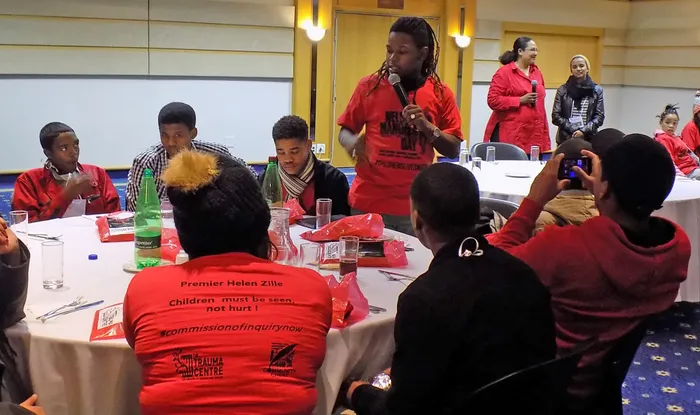Youth hailed as the architects of new Africa – but will they get a chance to lead?

Picture: Rusana Philander/African News Agency (ANA) Files – Romano Louw, 18, from Mitchells Plain, speaks at the Nelson Mandela Youth Dialogue about violence in his community. President Cyril Ramaphosa has reminded the youth that Mandela saw young people as the builders of a better Africa and world, the writer says.
By Edwin Naidu
South Africa talks a good talk on many things: youth development, commitment to gender equality, eradication of poverty, and a better life for all. The fact that the country is in darkness daily due to corruption and mismanagement at state utility Eskom is an indictment on a government with the best constitution and worst delivery in respect of it.
On Friday, days after a cabinet reshuffle that saw several golden oldies remain in the cabinet when they ought to have been enjoying retirement, President Cyril Ramaphosa addressed the inaugural Nelson Mandela Youth Dialogue at the Walter Sisulu University in Mthatha.
Through this dialogue attended by young leaders across the Continent, Ramaphosa said the Nelson Mandela Youth Dialogue brings together the architects of a new Africa.
The hopes of Africa are pinned on youth. “As young people, you are the next generation, the innovators, the change-makers and the agents of progress.”
Recalling the wisdom of Madiba, Ramaphosa said: “Sometimes it falls upon a generation to be great. You can be that generation. Let your greatness blossom.”
Mandela urged young people to be “the rock on which our future will be built, our greatest asset as a nation”.
“They will be the leaders of our country, the creators of our national wealth, and those who care for and protect our people.”
Ramaphosa reminded the youth that Mandela saw young people as the builders of a better Africa and world.
Sadly, Ramaphosa’s actions show the emptiness of his words concerning youth. Last Tuesday, he had an opportunity to do more than pay lip service to the youth of South Africa. Instead, he ignored the youth appointing Dr Nkosazana Dlamini Zuma, a woman in her seventies, as minister in the Presidency responsible for Women, Youth and Persons with Disabilities.
While I have nothing against Dlamini-Zuma holding this position, her appointment at 74 signifies a government at odds with the realities of the modern-day workplace. The retirement for many in the corporate sector is age 60, while in the public service, retirement is at 65. Yet, government officials can go on forever. What about passing the baton?
In a country with millions of unemployed youth, South Africans need action, not empty words concerning the bleak future. Ramaphosa failed to tell them that the future for many remains hopeless, with doors constantly shut in their face. In appointing Dlamini-Zuma to steer women, youth, and people with disabilities, the president missed an opportunity to show bold leadership.
There are many young people with disabilities rising above their impairment to do well. Such an appointment would have been welcome. But then, Ramapahosa is an uninspiring leader. He has been criticised for being an ineffective, dithering leader who consults endlessly, and the resultant poor end product is what is visible.
Just like women, who cannot count on the ANC to transform them into meaningful leadership positions, the youth have no future when the golden oldies keep a firm grip on the levers of power. Despite preaching to the gallery, men call the shots in the ANC.
Consider tiny, neighbouring Namibia; in 2020, President Hage Geingob appointed Emma Theofilus (23) as Deputy Minister of Information and Communication, making her the youngest member of parliament. This was remarkable. I listened to her speak at a Huawei technology forum in 2022. She was brilliant. Youth is no impediment. She brought fresh ideas and an understanding of the barriers facing society. Dlamini-Zuma would be great concerning women and people with disabilities but out of touch on youth matters.
Ironically, according to Ramaphosa, the conceptualisation of the Youth Dialogue was inspired by Nelson Mandela’s cherished dream to see the young people of Africa come together to unite and collaborate to solve the many challenges facing the Continent.
It was also inspired by the struggles and the work and lives of the giants of the Continent like Kwame Nkrumah of Ghana, Murtala Mohammed of Nigeria, Patrice Lumumba of Congo, Amilcar Cabral of Guinea Bissau, Agostino Neto of Angola, Eduardo Mondlane of Mozambique, Seretse Khama of Botswana, Albert Luthuli and many others.
The idea of bringing the Continent’s youth together to start important conversations about leadership, development and political change first came to Ramaphosa during a visit to Senegal in December 2021.
After delivering a lecture at Cheikh Anta Diop University, the students and Ramaphosa discussed various topics. These included the Covid-19 pandemic, the role of African universities in knowledge production, economic integration, sustainable development, constitutionalism, human rights and fundamental freedoms.
“It struck me then, as it always has when I travel in other parts of Africa, just how many opportunities there are for Africa’s youth to collaborate.”
Agreed, there is much that young people across the Continent can learn from each other’s experiences. They can draw on each other’s strengths and capabilities and encourage each other as they take up the mantle of leadership.
Let’s hope youth shine throughout the Continent as the old fogeys wield an iron-like grip on power. But there is no space for youth in Ramaphosa's inner circle.
Edwin Naidu heads up Higher Education Media Services – a social enterprise start-up involved in education in South Africa and the African continent
This article was written exclusively for The African. To republish, see terms and conditions.